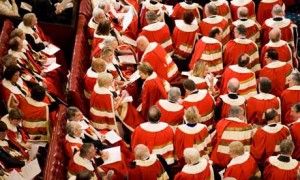
By John Pring Disability News Service 2nd March 2017
A disabled peer has accused the renowned fertility expert Lord Winston of trying to hijack his attempts to outlaw disability discrimination in abortion laws because of his “discriminatory eugenic agenda”.
The exchange in the House of Lords on Friday came as peers were debating Lord [Kevin] Shinkwin’s abortion (disability equality) bill, which he says would bring abortion legislation into line with the Equality Act.
The disabled Tory peer’s private member’s bill, which has reached the report stage, would make it illegal to carry out an abortion on the grounds of disability on a fetus that was more than 24 weeks old, unless there was a risk of serious, permanent damage to the mother or her life was at risk.
At present, Lord Shinkwin reminded fellow peers, a fetus can be aborted right up to the moment of birth, if it has a significant impairment or, as the Abortion Act 1967 describes it, “there is a substantial risk that if the child were born it would suffer from such physical or mental abnormalities as to be seriously handicapped”.
At a previous stage of the bill, he told fellow peers that “were a younger, unborn version of me to be detected in the womb today [the Abortion Act] and the [Department of Health’s] search-and-destroy approach to screening would make me a prime candidate for abortion”.
He said on Friday that his “disability rights bill” would bring the law on disability discrimination before birth into line with laws that address disability discrimination after birth.
But Lord [Robert] Winston, the fertility expert and television presenter – who has carried out pioneering work on allowing embryos to be screened for genetic diseases before being used for in vitro fertilisation – tabled an amendment that would exclude pregnancies where there was “a high probability that the fetus will die at, during, or shortly after delivery due to serious fetal anomaly”.
The Labour peer, who later withdrew his amendment, said: “Whether we like it or not, whatever our religious position might be, the fact is that we accept termination of pregnancy and I believe that most people in our society have the normative consideration that it is reasonable, in cases where a fetus is severely damaged and unlikely to survive or is going to be extremely ill and in great pain, to terminate that pregnancy.”
But Lord Shinkwin said that Lord Winston’s amendment was “cynical” and “reinforces discrimination because it singles out even more acutely a particular group for destruction on grounds of disability”.
He said that defining “fatal or life-limiting involves a degree of subjective judgment which is influenced by understandings and by the availability of technology, both of which can change with time”.
Lord Shinkwin also criticised the British Pregnancy Advisory Service, the Family Planning Association, and Antenatal Results and Choices – previously known as Support Around Termination For Abnormality – which had organised a meeting about his bill in the Lords, but failed to invite him.
He said the organisations had “insinuated and implicitly claimed” in their invitation to the meeting that the 230 disabled babies aborted after 24 weeks in 2015 had all been diagnosed with severe or fatal fetal abnormalities, when they could not possibly have known that because the Department of Health does not hold that information.
He had previously told fellow peers that there had been a 56 per cent increase in the number of terminations on grounds of disability after 24 weeks between 2010 and 2015, and a 68 per cent increase in the total number of terminations on the grounds of disability, with 3,213 in 2015.
He pointed out on Friday that, of the fetuses “aborted for the crime of having Down’s syndrome, for example, two were aborted at 25 weeks, one at 26 weeks, one at 28, one at 30, another at 31, three at 32 weeks, two at 33, two at 34 – and one at 39 weeks”.
Lord Shinkwin said the three organisations had an “overtly discriminatory agenda”, which he said also informed Lord Winston’s amendment and his “complete failure even to make contact with me”.
He said the amendment was “completely inappropriate and incompatible with the progress achieved on disability rights”, and he accused Lord Winston of “crass insensitivity” for “hijacking” the disability equality bill of a disabled peer “in order to advance a blatantly discriminatory eugenic agenda”.
Lord Shinkwin said the message of his opponents was “stark and bleak”, and was: “Let’s ignore the fact that these disabled babies are human beings, with an equal right to exist.
“Let’s reclassify them and call them fetal anomalies. Let’s go one better and call them serious fetal anomalies.”
He added: “Well this fetal anomaly, this proud member of your Lordships’ house, is having none of it.
“I utterly reject this medical mindset that clings to the idea that a disabled baby is a medical failure to be eradicated through abortion. I beg no one for my equality.
“I know I have as much right as anyone to be alive.”
Lord Winston denied that his amendment was “cynical” and insisted that it was “compassionate”.
He said: “Perhaps unlike the noble Lord who has promoted this bill, I have been in constant contact with pregnant women who have had to go through these difficult decisions throughout their pregnancy throughout my professional life.”
He said that many women did not attend an antenatal clinic until after 24 weeks into their pregnancy.
He added: “I do not feel prepared to have the finger pointed at me saying that I am not trying to do my best, in a small way, for a society where disabilities occur.”
